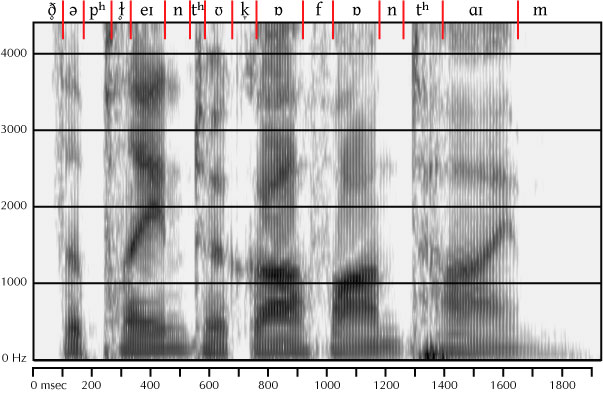

Eth + Under-Ring
[ð̥], IPA 131 + 402
I give up. When in doubt, if it doesn't start with a glottal stop, and this doesn't,
guess Eth. It won't make any difference. Just guess. But here, I worked for
I don't know how many utterances trying to get a) noise and b) voicing. Well, at least
this time there is noise. Sort of. It's way too weak and short to be an initial sibilant,
but from just it's frequency, that's what it looks like.
Schwa
[ə], IPA 322
Vowel. When in doubt, guess schwa.
Lower-Case P + Right Superscript H
[pʰ], IPA 101 +404
Well,. gap. Nice and voiceless, with a long VOT, so clearly aspirated.
The transitions in the schwa all point downward, suggesting labial. The burst is a little
misleading, in that there's a concentration of high amplitude energy in the very high
frequencies, which makes the release look a little sibilant, i.e. coronal. But
the release burst, such as itis doesn't have the straight up-and-down loud, sharp
transient I'd expect of so plosive a [t] release.
Tilde L (Dark L)
[ɫ], IPA 209
Under-Ring
[̥], IPA 402A
Lower-Case E + Small Capital I
[eɪ], IPA 302 + 319
Lower-Case N
[n], IPA 116
Lower-Case T
[tʰ], IPA 103 + 404
Upsilon
[ʊ], IPA 321
Lower-Case K
[k], IPA 109
Lowering Sign
[̞], IPA 430
Turned Script A
[ɒ], IPA 313
Lower-Case F
[f], IPA 128
Turned Script A
[ɒ], IPA 313
Lower-Case N
[n], IPA 116
Lower-Case T
[tʰ], IPA 103 + 404
Script A
[ɑ], IPA 305
Small Capital I
[ɪ], IPA 319
Lower-Case M
[m], IPA 114